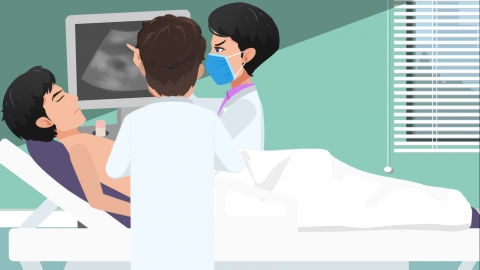Why does drooling occur after a cerebral infarction?
Cerebral infarction refers to cerebral infarction (cerebral梗死). Drooling after cerebral infarction may be caused by incomplete recovery of swallowing function, facial muscle relaxation, aspiration pneumonia, facial paralysis, epilepsy, and other conditions. Improvements can be made according to the specific circumstances. It is recommended to seek timely medical attention at a hospital and receive treatment under the guidance of a physician.

1. Incomplete recovery of swallowing function: Cerebral infarction damages the nerves controlling swallowing, leading to swallowing dysfunction. Saliva in the oral cavity cannot be swallowed normally and thus flows out of the mouth. After the patient's condition stabilizes, swallowing function training can be conducted under the guidance of a professional rehabilitation therapist, such as dry swallowing exercises, ice stimulation of the throat, etc., to gradually restore swallowing ability.
2. Facial muscle relaxation: Cerebral infarction affects the facial nerve function, causing the facial muscles to lose normal tension and coordination. The orbicularis oris muscle becomes relaxed, making it difficult to effectively close the mouth, leading to drooling. This issue can be improved by massaging the facial muscles, such as massaging the cheeks and lips, as well as performing facial expression exercises like frowning, closing the eyes, and puffing the cheeks to strengthen muscle strength.
3. Aspiration pneumonia: Patients with cerebral infarction often experience difficulty swallowing, making them prone to aspirating saliva, which can lead to aspiration pneumonia. The inflammation irritates the respiratory tract, increasing secretions and causing drooling, accompanied by symptoms such as fever, cough, sputum production, and difficulty breathing. Patients can follow medical advice to use medications such as amoxicillin capsules, cefuroxime axetil tablets, and ambroxol oral solution to aid recovery.
4. Facial paralysis: If cerebral infarction affects the facial nerve nucleus or its conduction pathways, facial paralysis may occur. Muscular movement on the affected side of the face becomes restricted, resulting in a crooked mouth corner, and saliva cannot remain normally in the oral cavity, leading to drooling. This is accompanied by symptoms such as facial muscle paralysis and incomplete eyelid closure. Patients can use medications such as mecobalamin tablets, vitamin B1 tablets, and prednisone tablets under a doctor's guidance to alleviate symptoms.
5. Epilepsy: Abnormal discharge of neurons in the brain after cerebral infarction may trigger epileptic seizures. During a seizure, oral muscles spasm and swallowing becomes disordered, leading to drooling. Symptoms such as limb convulsions and loss of consciousness may also occur. It is recommended to follow medical advice and use medications such as sodium valproate sustained-release tablets, carbamazepine tablets, and levetiracetam tablets to control seizures and reduce drooling.
In daily life, patients should actively manage their health, maintain a healthy diet and sleep schedule, and get appropriate rest to aid recovery.






